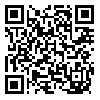1- , E-mail: rajabireza@scu.ac.ir
Abstract: (16820 Views)
Objectives: The purpose of this study was to investigate factorial structure (construct validity) and reliability of the Persian version of the Revised Shyness Scale among university students. Method: 182 students were randomly selected from five schools of Chamran University using stratified sampling, and completed the Persian version of the Revised Cheek Briggs Shyness Scale (PRSS) and Rosenberg Self-esteem Scale. Cronbach’s alpha was used to assess the reliability of Shyness Scale. To evaluzte the construct validity, discriminated validity and confirmatory factor analysis were used. Results: Cronbach’s alpha for the whole scale (14 items), and in extracted three factors was 0.18 to 0.67. The item- analysis of PRSS showed that the items varied between 0.10 to 0.60 and all (except for item 12) were significantly correlated with the total score of the scale (P<0.0001). Discriminated validity coefficient was negatively significant between PRSS and Rosenberg Self-esteem Scale was -0.23 (P<0.002). Also, based on the factor analysis of this scale using the principal components analysis (Varimax rotation) three factors were extracted: assertiveness deficit and loss of self-confidence, social distress and withdrawal, and more circumscribed stranger shyness. Confirmatory factor analysis showed that one-factor, and two-factor models, and particularly three factor model PRSS seem to provide a satisfactory and parsimonious fit to the data in the present study. Conclusion: Considering the validity and reliability of the Shyness Scale, this scale can be used for the measurement of the degree of shyness.
Type of Study:
Original Research |
Subject:
Psychiatry and Psychology Received: 2011/07/3 | Published: 2011/02/15




